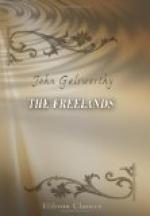“What principles can possibly be involved in going against the law?”
“And where the law is unjust?”
Stanley was startled, but he said: “Remember that your principles, as you call them, may hurt other people besides yourself; Tod and your children most of all. How is the law unjust, may I ask?”
She had been sitting at the table opposite, but she got up now and went to the hearth. For a woman of forty-two—as he supposed she would be—she was extraordinarily lithe, and her eyes, fixed on him from under those twitching, wavy brows, had a curious glow in their darkness. The few silver threads in the mass of her over-fine black hair seemed to give it extra vitality. The whole of her had a sort of intensity that made him profoundly uncomfortable. And he thought suddenly: ’Poor old Tod! Fancy having to go to bed with that woman!’
Without raising her voice, she began answering his question.
“These poor people have no means of setting law in motion, no means of choosing where and how they will live, no means of doing anything except just what they are told; the Mallorings have the means to set the law in motion, to choose where and how to live, and to dictate to others. That is why the law is unjust. With every independent pound a year, this equal law of yours—varies!”
“Phew!” said Stanley. “That’s a proposition!”
“I give you a simple case. If I had chosen not to marry Tod but to live with him in free love, we could have done it without inconvenience. We have some independent income; we could have afforded to disregard what people thought or did. We could have bought (as we did buy) our piece of land and our cottage, out of which we could not have been turned. Since we don’t care for society, it would have made absolutely no difference to our present position. But Tryst, who does not even want to defy the law—what happens to him? What happens to hundreds of laborers all over the country who venture to differ in politics, religion, or morals from those who own them?”
‘By George!’ thought Stanley, ’it’s true, in a way; I never looked at it quite like that.’ But the feeling that he had come to persuade her to be reasonable, and the deeply rooted Englishry of him, conspired to make him say:
“That’s all very well; but, you see, it’s only a necessary incident of property-holding. You can’t interfere with plain rights.”
“You mean—an evil inherent in property-holding?”
“If you like; I don’t split words. The lesser of two evils. What’s your remedy? You don’t want to abolish property; you’ve confessed that property gives you your independence!”
Again that curious quiver and flash!
“Yes; but if people haven’t decency enough to see for themselves how the law favors their independence, they must be shown that it doesn’t pay to do to others as they would hate to be done by.”




